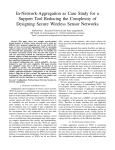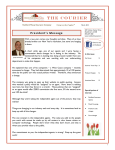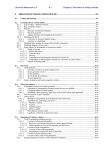Download THE FORTY DAYS OF FAITH USERS MANUAL
Transcript
THE FORTY DAYS OF FAITH USERS MANUAL Each year during Lent (the 40 Days before Easter), we do a faith experiment called 40 Days of Faith. Lent is historically a time in which the church prepares for Easter. The historic wisdom of God’s people has been that you and I are served by a yearly reminder of Jesus’ resurrection power. And so Lent prepares us to believe again in Jesus’ work in our lives in fresh ways. The 40 Days of Faith involves traditional Lenten disciplines like (for many people) fasting and a renewed attention to the Bible. It invites us to believe again in the actual work of God in our lives through some practices in prayer. It invites us to believe in God’s work for a small number of people around us who might have very little experience of that work. And it encourages us that we’re a part of something bigger than we might realize. All in all, it can be a very faith-‐building time! This year, Charles Park (pastor of The River in New York) and Dave Schmelzer are working together to put together a 40 Day’s experience for a number of churches that have been partnering together from all over the country in a new network called “Blue Ocean Faith”—our church included! (Dave wrote this manual, which I [Ken] have adapted, so if it doesn’t sound exactly like me, that’s probably Dave’s voice popping through.) Let’s focus on one big idea together—that we want connection more than we want answers. One of the great gifts of the 40 Days is that we get to do this together. I don’t know about you, but I do a lot better with God when I’m pursuing faith with other people. We have a couple of groups this year, one led by Niki Piotrowski and another by Ginger Liemohn (pronounced lee-‐moan), for those of you who would enjoy meeting weekly with others to support your 40 Days of Faith experience. But you can also meet with a friend (spouses count as friends!) or simply keep in touch with a few others who are doing this in whatever way you arrange (occasional emails—daily texts, meeting for coffee a few times through the Lenten season, for example.) Our Lenten Theme—It’s All About Connection-‐-‐is actually more surprising than it might appear at first glance. For many of us, “growth in God” has focused on new knowledge (of the Bible or of theology or of the latest hot Christian book) or on new opinions (as we “exegete” the culture around us or double down on what’s sin and what’s not) or maybe on new power (as we explore new practices in prayer or fasting). Some of those things sound great to me—and will have echoes in this 40 Days of Faith. But the power of seeing life with God as centering on connection is that we’re looking for a sort of coaching into an actual, relational experience more than for any other thing. And, as we pursue this, we discover to our happy surprise that the connection we’re being offered isn’t just with God, but is also with ourselves and with the world around us. And we discover that we actually need and crave this connection even more than we need overt answers to our most pressing problems. Job teaches us this Have you ever read the book of Job? It’s not the easiest read! It starts with a strange bet between God and Satan that brings unimaginable misery into the life of this good man, Job. Just about everyone he loves dies. He loses all his assets. He gets horrible, chronic diseases. His life goes from great to catastrophic. And then the bulk of the book involves his friends (although whether they qualify as “friends” is one of the themes of the book) confidently telling him why these horrible things have happened to him—with each of their “answers” being inaccurate and simplistic. (They mostly focus on karma. “You must have done bad stuff to bring this amount of bad stuff your way.”) Finally Job gets to meet with God directly. “At last!” we think. “Now this poor man will finally get the answers he needs!“ But that’s not what happens at all. God is hard-‐line. He effectively says, “Look, were you there when I created the universe? You want answers? You’re not going to get any answers!” You’d expect Job to be upset afterwards. But Job does not object, despite freely expressing his complaints earlier. Instead of answers, he gets an encounter with the living God. He is, of course, profoundly humbled in the encounter, but humility promotes connection. Perhaps Job learns that answers even to our most compelling questions, don’t satisfy as much as we might hope. And that the greatest thing abut God is God. What does it mean to connect: with ourselves, others, the wide world, and God? This is something we will explore together during our 40 Days of Lent. Our sermons will upack the wisdom and insight of Scripture on connection as the heart of what life with God is about. And Charles Park, from the River—a Blue Ocean Church in Lower Manhattan, is preparing a daily devotional guide that will walk us through the grand sweep of the Bible—from beginning to end—with a keen eye out for this connection theme. We will send that to you in installments as a pdf as soon as it becomes available (very soon!) So are you game for a faith experiment about connection? Here’s how it could work. I’ll list the elements here then explain: 1. Enjoy the daily Bible guide about connection. 2. Each day, pray three prayers (more about each in a moment) 1. What do you want Jesus to do for you? 2. What do you want Jesus to do for your 6? 3. What do you want Jesus to do through your church? 3. Connect with your fellow Blue Ocean churches through Horatio (www.hellohoratio.com) 4. Consider some sort of fast Enjoy the Daily Bible Guide about connection. One of the best ways to connect with Scripture is to trace a central theme as it unfolds through the whole narrative of the Bible—from start to finish. We begin to see that the Bible is not just a mishmash of different writings: it has a plot and themes that emerge and are illuminated from many angles. The Daily Bible Guide offers a very short (page length) reflection on a key text, drawing our attention to the connection theme. Read it each day and let it stimulate your own reflection. And you may just discover how rich with insight the Bible is in the process of connecting with its message on a daily basis. Each day, pray the three prayers. 1. What do you want Jesus to do for you? Over the years, many people have found this one prayer to be the most powerful part of the 40 Days. And yet it can, at first blush, seem...uncomfortable...self-‐interested. After all, there are lots of people in the world with problems worse than yours or mine! My (Ken speaking here) wife Julia is an Episcopal priest. She tells a joke that is popular among her Episcopalian peeps: “Why hasn’t God solved world poverty yet?” Why? “Because he’s too busy answering the prayer of Evangelicals for parking spaces!” And yet…. Is it wrong to pray for parking spaces? Well yes, if we never pray for an end to poverty (or more to the point, do something to share with those in need.) But is it always wrong to pray for parking spaces? What if we need a parking space? What if we find ourselves in Downtown Ann Arbor and the tank is near empty and we really have to use a restroom soon? Wouldn’t it be OK to pray for a parking space? Plus, Jesus seems to encourage us to practice a “child like” faith. To regard God as a parent and ourselves, in relation to God, as little children. When little children ask a parent for things, even very small things, things that have not been well thought out perhaps, things that in the grand scheme of things seem vanishingly insignificant, isn’t it…. well, expected, encouraged, even something that a parent might delight in? And isn’t the Bible loaded with encouragements to ASK already! Our relationship with God is marked by freedom. That means, among many other things, that we are free to ask, and God is free to respond (or not.) Now, of course, the risk of praying every day for something you actually want is that you won’t get it and you’ll be disappointed. Why did you expend all that faith only to be so disappointed?! And you’re very right: those of us who’ve participated in lots of 40 Days of Faith almost certainly haven’t seen all of our prayers answered. Some haven’t seen any of our prayers answered! So why pray then? Charles Park has this response to that great question: “Genuine connection with God actually isn’t possible unless ‘no’ is taken well. A connected person handles 'no' without turning bitter and resentful. That's a sign you have a sense of your own self as well as a respect for others (God's included) sense of self.” So the first question is What do you want Jesus to do for you? Take a moment and write it down somewhere. And yet, hang on, didn’t we say only a little earlier in this user’s manual that faith actually isn’t so much about answers to our most pressing problems as it is in connecting to God, ourselves and the world around us? What gives? This is I’ve been helped by asking myself two questions here: What do I want Jesus to do for me during this 40 Days of Faith? And then also asking: What do I really want Jesus to do for me? If I’m praying, say, for a job, would I also be happy even in the absence of a job if I ended up feeling completely provided for—and was? What’s behind what I’m asking Jesus to do for me? So, in my case (Dave Schmelzer’s): for years I prayed to be a successful playwright. But what if, in the absence of that, Jesus gave me great outlets both for my creativity and to be recognized for my creativity? Might that meet the need? Once you’ve written down that one thing you want to ask Jesus to do for you, congratulations! You’ve taken a risk with God, and as someone once said, “Faith is spelled R-‐I-‐S-‐K.” Now what? • Ask God for these things every day during the 40 Days. As you ask, he might speak to you about what you’re asking for. Obviously, pay attention to that! But, in the spirit of Matthew 7, God gives good gifts to those who “keep on asking”! • Tell someone else what you wrote down and ask them to pray for you about those things too. This might be your spouse, if you have one and/or someone in your household or your small group, if you have one. And it would be neighborly of you if you prayed about their things! Jesus says he’s uniquely present and at work when two or more people come before him with things (Matthew 18:20). Your chances of seeing something happen go way up when someone else is praying too—and they might even have more faith than you do, so you can leech off of them! 2. What do you want Jesus to do for your 6? An important way many people have started powerful connections to their world has been by praying for their 6. What if our prayers might not only help us, but might also help 6 local friends or coworkers or acquaintances whom, best as we can tell, don’t seem to be experiencing much from God? Maybe they’re not experiencing much from God because no one is praying for them! Praying particularly for local friends has proven helpful because it helps us see the people God has actually put in front of us. By all means pray for your grandmother in Topeka. But, during these 40 Days, why don’t you also pray for 6 people who are local and seem distant from all the benefits God might offer them? Just name them every day in prayer. “Lift them up” as the saying goes. Nothing fancy. But as you go along, you may find yourself feeling more connection to them and as you do, you may find yourself being more specific in your prayers for them. Is there a point to this prayer for your 6? Yes. The point is love. God so loved the world…. And when we pray, we dip into that love, and it’s not just a general love for all humankind. It’s also a very particular love for particular people. And when we pray for others like this, something happens—in us at least and often in them. (At any rate, it can’t hurt and it might help, so what’s the downside?) So who are your 6? (If you’re not sure, why don’t you take a moment to ask God?) 1. _____________________________________________ 2. _____________________________________________ 3. _____________________________________________ 4. _____________________________________________ 5. _____________________________________________ 6. _____________________________________________ 3. What do you want Jesus to do through and for your church? We (Ken and Emily) talked this over with our pastoral team this week and want to suggest that we join together in a two part prayer for Blue Ocean Faith Ann Arbor: First, that together we become a place where others who are like us, who often feel on the outside of God, or of the church, or of the lucky fortunate few, find a place among us where they can begin to taste what it’s like to be at home with God. That’s the wordy first part. And the second part is this: that God provides us with a literal place to gather on Sunday mornings that works well for the next year. Background: we have a short-‐term (60 day) rental agreement with the Genesis board (composed of representatives from St. Clare’s and Temple Beth Emeth.) Soon we will be negotiating a longer-‐term (one year) rental agreement with Genesis. As we explore this next step, we need guidance from God. Is this the place he wants us to settle down for a spell? Will it work well for us and for our hosts who have been so gracious to us? Will it be enough room for those God may be sending our way? We don’t have all the answers, so we need God’s direction. Connect with your fellow Blue Ocean churches through Horatio. (www.hellohoration.com) Okay, we’re thinking kind of big. If our biggest dream is to connect—with God, with the world around us, and with ourselves—are there ways we can offer that to everyone around us? Would that even teach those of us in Blue Ocean churches some key skills and perspectives that we really need? So, in talking about this, we realized that all of us are involved in some fascinating conversations with really interesting people every day, often about the deepest things in life. Horatio is a place where people from many different backgrounds—faith, no faith, exploring faith, secular, not sure, other—can speak freely about what matters most to them. We’ve just debuted an ambitious, Blue Ocean sponsored site to make this possible. It has a curious name, Horatio. We named it after Hamlet’s friend who, after he sees the ghost of Hamlet’s father and says (basically) “eek!”, gets this response from Hamlet: “There is more in heaven and earth, Horatio, than is dreamt of in your philosophy.” That gave the site its tagline: “Little us. Big universe.” Dave Schmelzer is leading this effort aided by an editorial team that includes a columnist for a major metropolitan newspaper and two academics. Our dream is to have fresh content each weekday, along with regular podcasting and a video channel in which a team of filmmakers from all over the country will be scouring film festivals for short, amazing content on the meaning of life that you won’t find from any other source. We’ll be exploring subjects from workplaces, from culture, from science, from spirituality and from our day-‐to-‐day lives. Sound fun to you? There are two easy ways to support this: (1) Like it on Facebook. (Look under “Horatio.) (2) Subscribe to it at the link below. (We’re in our first month or so of actually being up and running, so be charitable if we miss the occasional day.) Would you freely pass on (via social media or email or whatever settings serve you) content that hits you? And would consider contributing to the conversation of your fellow Blue Ocean congregants from around the country by reading the “write for Horatio” tab and pitching us your content? Remember, you find Horatio at: http://www.hellohoratio.com/ Consider some sort of fast. What does fasting do? Fasting tells God and our own spirits that we really are desperate for God to meet some need or hope that we have. If you participate in this year’s 40 Days, you’re hoping for profound vision for your life. That sounds like “fast territory” to me. Though fasting—in any fashion (and we’ll talk about some options in a minute)—is, by definition, hard, it’s actually meant to be a joyous opportunity. Suddenly we’re really serious about something with God; we’re really expecting him to come through; we aren’t just playing around. That can often be exhilarating! What are options for fasting? Well, first off, fasting often involves abstention from food in some way. Most people find themselves fasting from one or two particular things, like caffeine, desserts. However many people are helped by more-‐aggressive choices. So, for shorter fasts (e.g one day per week) that can be a total abstention from food. These are usually called “water fasts,” because water is the only thing going into us. A couple of caveats: If you find yourself struggling with an eating disorder, don’t mess with fasting from food, or at the very least talk it over with a counselor first. And I’d recommend not doing a fast as a way to lose weight—that’s not what it’s about as a spiritual discipline. Are there any non-‐food-‐related options? You bet! Fasting from television is a popular choice for folks who aren’t fasting from food. Or computer games. Or catalogues. Or criticism. Or whatever you’d notice. These can really involve, under God’s direction, doing without anything that feels costly to give up for a season. The point of fasting is that, under God’s direction, we’re feeling desperate for something and we direct that desperation towards God. It’s just hard to truly be desperate for God and what he might do for us when our bellies are full and all our needs are abundantly provided for. What does it mean to fast “for” something? If you fast, I’d encourage you to let God know, frequently, what it is you’re fasting for which, I’d think, would at least tie into the “what do you want Jesus to do for you or your 6 or your church during this Leap of Faith?” category. What if I don’t want to fast? That’s easy! Don’t. You know yourself and your situation better than anyone else, so trust your discernment. (Refrigerator Reminder Sheet below!) 40 Days of Faith REFRIGERATOR REMINDER SHEET Enjoy the daily Bible guide about connection. Each day, pray the three prayers: 1. What do you want Jesus to do for you? And it’s corollary: What do you really want Jesus to do for you? Unless its just too personal, tell someone else what you wrote down and ask them to pray for you about those things too. 2. What do you want Jesus to do for your 6? List their names here: 3. What do you want Jesus to do through and for your church? The prayer Blue Ocean Faith, Ann Arbor is praying together: Lord help us to become a place for those who have had difficulty finding a place with you or with a faith community, and guide us in securing a place for us to gather on Sundays for the next year. AMEN! Add here any prayer that you feel personally led to pray (something more specific or other than the prayer we are praying together for our common.) Remember to check in with voices of our fellow Blue Ocean churches through Horatio: http://www.hellohoratio.com/ Consider some sort of fast. [Note what you’ve decided on here}





























